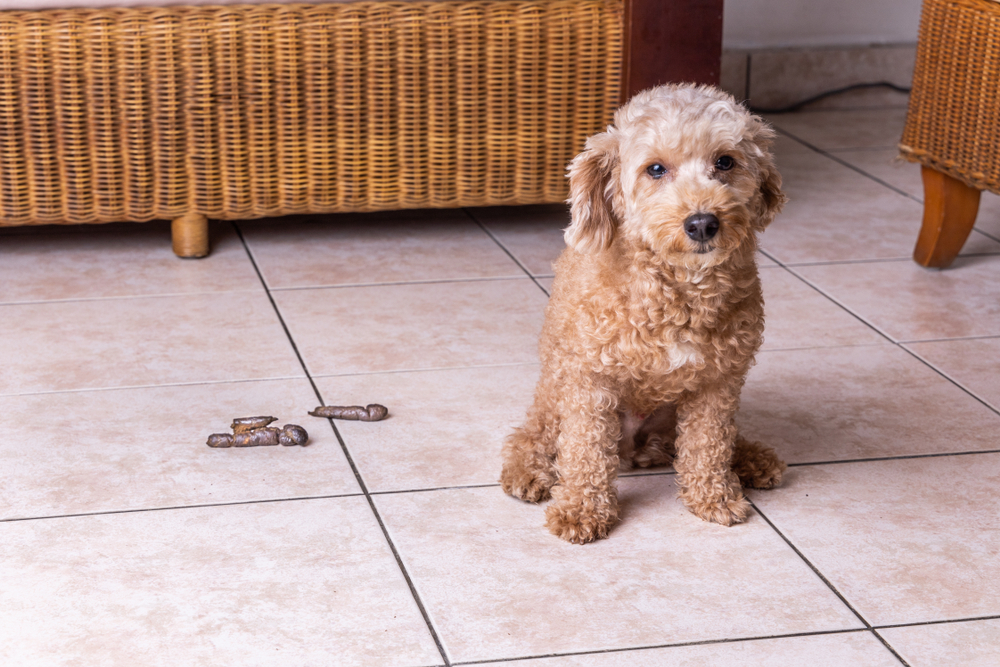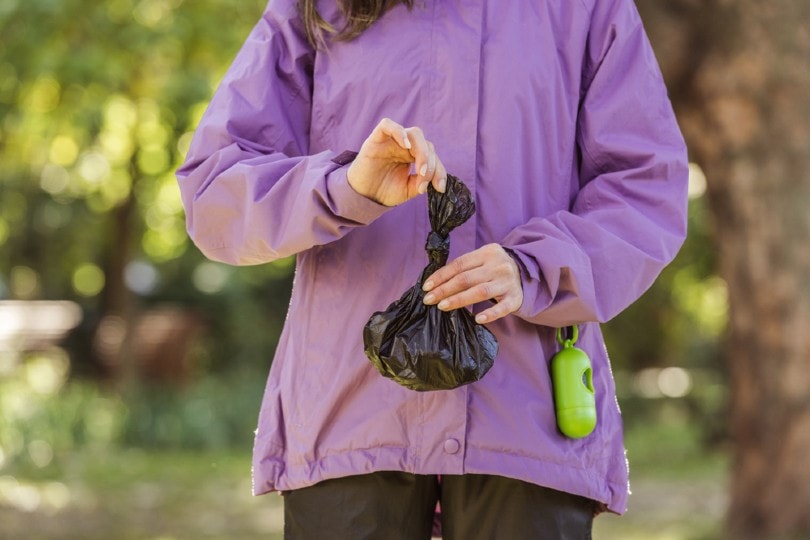You might think it’s a no brainer—poop goes down the toilet. You toss it in, flush it down, and never have to look at it again. If you’re cleaning up mountains of pup poo due to potty training or incontinence, you might be sick of putting it in bags just to smell up your kitchen trash can (gross)!
But lucky for you—you looked it up. With most water systems, it’s totally fine to put dog poop in your toilet. Sometimes, though, it really isn’t advisable—and it’s all due to your particular sewage system. Let’s explain!


Flushing Dog Poop
Our dogs’ poop is much different from ours. They carry different bacteria, parasites, and viruses in their waste that humans don’t have. If you have city water, it will travel to a plant to be sanitized and purified.
The Environmental Protection Agency, or EPA, actually states that flushing dog poop is an eco-friendly way to get the job done. The water treatment facilities have the resources and proper treatments to eliminate any pollutants from the returned waste.
So, flushing dog poop when you have city water is a definite yes!




Important Facts To Consider When Flushing Dog Poop
1. Do Not Flush If You Have a Septic Tank
While flushing is a fabulous option if you have city water—it isn’t the case if you have a septic tank. In fact, it’s very frowned upon, for good reason! If you have a septic tank, it can actually clog the drain field, leading to pricey fixes and plumbing issues.
2. Never Flush Bagged Poop
If you bag poop in a dog poop bag or other plastic material—never flush! It goes without saying that these bags will never break down in the sewage system, leading to clogging and several other issues if it travels through the system.


3. Never Flush Wipes of Any Kind
Even if dog wipes read “flushable” on the packaging, don’t do it. While one wipe in a blue moon probably won’t hurt the lines, doing so repeatedly can really clog your sewage system—the same way bulk toilet paper or feminine hygiene products can.


Other Ways to Dispose of Dog Poop
If you live in a home that has a septic system, now you know that you can’t just flush it down the toilet. But what can you do instead? Luckily, there are other options.
Biodegradable Doggie Bags
If you are an environmentally conscious person, you may want to use biodegradable doggy bags designed to store poop. You can sack it up and toss it in the trash—but keep in mind this can be a stinky option.
So, always make sure you’re ready to take out the garbage when you use these bags. Paper bags will also seep, so never store dog poo in a paper bag before tossing it in the trash.
Even if your dog’s poop is in a biodegradable bag, you should still never flush it. The material won’t break down in the sewage lines quickly enough and it can easily lead to clogging.


Specialized Device
There are ways to dispose of your dog’s waste in a container that is separate from your own garbage. You can keep a special can outside just for clean-up purposes, so it isn’t stinking up the house.
Or, you can buy a specialized product designed specifically for pet waste. A really good example of this would be the Pet Genie. While there is a more popular variant designed for cat litter, they can be really terrific products for dog owners.
There are other options, too! On sites like Amazon and Chewy, there are septic-style dog poop containers that you can use for yard clean up and maintenance. You can mount them in your yard or keep it near the back door for easy access.
Organic Compost
Composting can reduce the volume of dog waste by over 50% but it’s not the most environmentally friendly option on this list surprisingly. We want to make it very clear that composting is not safe if you plan on using it for consumable vegetation. There are parasites, bacteria, and other pathogens that live in dog poop that aren’t killed with composting.
If you put this on your veggies, you can transmit illness to you or anyone eating the produce. No one wants that! After all, these bugs can wreak havoc on your system and make you and your loved ones very sick.
Composting your dog’s feces could help your flower beds and other non-edible plants flourish but keep in mind during rainstorms, the runoff from your garden could end up contaminating local waterways. This is why we don’t overly recommend composting unless you bury the product at least 12 inches deep to avoid runoff.




Conclusion
Now you have a better idea on the do’s and don’ts of poop disposal. If you live within the city limits, keep in mind that the Environmental Protection Agency does give permission to flush dog poop to those living with a city sewer system so it will properly be treated.
Now, if you don’t have this luxury, you have other options too! There is no need to stink up the kitchen trash with lumps of messes when you can dispose of it in smarter ways.
Featured Image Credit: Gorsky Roman, Shutterstock






